13. Custom analysis¶
13.1. Summary:¶
13.2. How Exakat runs an analysis¶
An analysis is the smallest unit of work on the Exakat engine.
An analysis is constituted of several elements :
- A name, including a prefix called ‘folder’.
- A class, that extends ExakatAnalyzerAnalyzer.
- A documentation
- Unit tests
The exakat command analyze runs an analysis, either alone, or as a member of one category. An analysis may be part of multiple categories. Categories gathers several analysis together, to be used by a report.
# run one analysis alone
php exakat analyze -p test -P Structures/AddZero
# run an analysis as apart of of a category : Structures/AddZero belongs to Analyze
php exakat analyze -p test -T Analyze
An analysis can only be run after loading the code in the central database, with the ‘load’ command. It is then ‘dump’-ed before being reported as an audit.
The prefix is used for internal identification and storage. It is unique.
13.3. Quick startup¶
To create a new analysis, you must work with the Exakat source code. Start by cloning the repository :
git clone exakat https://github.com/exakat/exakat.git
Then move to the cloned directory. Here, call the following script to create an analysis :
php scripts/createAnalyzer Custom/FirstTest
This script creates the following files :
- library/Exakat/Analyze/Custom/FirstTest.php
- human/en/Custom/FirstTest.ini
- tests/analyzer/Test/Custom/FirstTest.php
- tests/analyzer/source/Custom/FirstTest.01.php
- tests/analyzer/exp/Custom/FirstTest.01.php
- It also updates a file called data/analyzers.sqlite
Open library/Exakat/Analyze/Custom/FirstTest.php in your favorite IDE. The code looks like the following :
<?php
/*
* Copyright 2012-2018 Damien Seguy – Exakat Ltd <contact(at)exakat.io>
* This file is part of Exakat.
*
* Exakat is free software: you can redistribute it and/or modify
* it under the terms of the GNU Affero General Public License as published by
* the Free Software Foundation, either version 3 of the License, or
* (at your option) any later version.
*
* Exakat is distributed in the hope that it will be useful,
* but WITHOUT ANY WARRANTY; without even the implied warranty of
* MERCHANTABILITY or FITNESS FOR A PARTICULAR PURPOSE. See the
* GNU Affero General Public License for more details.
*
* You should have received a copy of the GNU Affero General Public License
* along with Exakat. If not, see <http://www.gnu.org/licenses/>.
*
* The latest code can be found at <http://exakat.io/>.
*
*/
namespace Exakat\Analyzer\Custom;
use Exakat\Analyzer\Analyzer;
class FirstTest extends Analyzer {
/* Remove this if useless
public function dependsOn() {
return array('MethodDefinition');
}
*/
public function analyze() {
$this->atomIs('Identifier')
->back('first');
$this->printQuery();
$this->prepareQuery();
}
}
?>
The main part of the analysis is the analyze method, so we’ll focus on it. It has a very simple example code, and runs a debugging tool. Let start by removing the line $this->printQuery();.
For this example, we’re going to look for useless additions : something like $a + 0. For that, we need to detect additions, check that the operator is + and find if one of the operand is 0. For that, we’re going to replace the first call to $this by the following code :
$this->atomIs('Addition')
->codeIs('+')
->outIs('RIGHT')
->atomIs('Integer')
->codeIs('0');
$this->prepareQuery();
The query may be read as the following : find all atoms that are ‘Addition’, check if the code is ‘+’, then go to the ‘RIGHT’ expression, check if the atom is an ‘Integer’, then check if the value is ‘0’. If all of those steps are valid, the resulting element is now a result for our analysis.
The next call to ‘prepareQuery’ means that this query is complete.
At that point, our analysis is build with one query. It is executed by the exakat engine.
Now, we need to start testing our analysis and check if all works as expected. The simplest is to rely on the unit tests to validate the analysis.
Open the file tests/analyzer/source/Custom/MyFirst.01.php. Inside, you’ll find an empty PHP script.
<?php
?>
Let’s complete this script with code that we intend to analyse. For that, we simply PHP code that hold the pattern we are looking for. For example :
<?php
$a + 0;
0 + $a;
1 + $a;
$a + 1;
?>
As you can see, we added patterns of code that we would like to find, like $a + 0 and 0 + $a. We also added patterns of code we don’t want to find, like $a + 1 and 1 + $a. It is important to tell the tests what we expect, and what we want to avoid.
Save that file, and open the next one : tests/analyzer/exp/Custom/MyFirst.01.php.
<?php
$expected = array('',
'',
);
$expected_not = array('',
'',
);
?>
This file holds the expected values and the values we want to avoid. The expected values are $a + 0 and 0 + $a, so added them in the $expected array. The unwanted values are $a + 1 and 1 + $a, so added them in the $expected_not array.
<?php
$expected = array('$a + 0',
'0 + $a',
);
$expected_not = array('$a + 1',
'1 + $a',
);
?>
Save the file too. We are now ready to run this test with PHPunit. Check that PHPunit is installed, then run the test.
cd tests/analyzer/
phpunit Test/Custom/MyFirst.php
You should have a result like this :
PHPUnit 7.3.5 by Sebastian Bergmann and contributors.
. 1 / 1 (100%)
Time: 2.01 seconds, Memory: 10.00MB
There was 1 failure:
1) Test\Custom_MyFirst::testCustom_MyFirst01
1 values were found and are unprocessed : 0 + $a
source/Custom/MyFirst.02.php
exp/Custom/MyFirst.02.php
phpunit --filter=01 Test/Custom/MyFirst.php
Failed asserting that 1 matches expected 0.
FAILURES!
Tests: 2, Assertions: 5, Failures: 1.
In the first analysis, we have build a query to look for $a + 0 but not for 0 + $a. It is a good thing that we added tests for them, so we need to add more query to the analysis.
Open again the ‘library/Exakat/Analyze/Custom/MyFirst.php’, and, inside the analyze() method, below the first prepareQuery(), add the following code to search for 0 + $a :
$this->atomIs('Addition')
->codeIs('+')
->outIs('LEFT')
->atomIs('Integer')
->codeIs('0');
$this->prepareQuery();
An analysis may run several queries. In this case, we have searched for ‘$a + 0’, but we should also check for ‘0 + $a’. Addition is associative, so 0 may be useless on the right or on the left.
PHPUnit 7.3.5 by Sebastian Bergmann and contributors.
. 1 / 1 (100%)
Time: 2.82 seconds, Memory: 10.00MB
This means that the Unit Test found the values we expected, and it also didn’t find the values we didn’t want.
Congratulations! This is your first analysis, and it is time to celebrate! Welcome to the great family of static analyzers.
13.4. Analysis structure¶
An analysis class is build with 4 elements.
- analyze() method
- dependsOn() method
- $phpVersion property
- Analyzer extends
13.4.1. The analyze() method¶
The analyze method is the most important. It is the method that does the actual analysis.
The method doesn’t return anything.
13.4.2. The dependsOn() method¶
This method returns the list of other analysis on which the current analysis depends on. For example, an analysis may target PHP functions : it relies on another analysis that detects the PHP functions, then, add it own layer of review. The other analysis must be processed first, and the Exakat engine run the dependencies before it runs the current analysis.
The list of dependency is a array of strings, with the usual analysis format : for example, array(‘Functions/IsExtFunction’). Multiple analysis may be returned by that method. If the current analysis is autonomous, the method may be omitted, or it may return an empty array.
13.4.3. $phpVersion property¶
The protected $phpVersion property configure the analysis to run with specific versions of PHP. For example, Structures/Break0 is an analysis that can only run until PHP 5.4 : after that version, PHP doesn’t compile code that uses break 0;. Thus, there is no need to run the current analysis on newer PHP versions.
If the analysis works on every PHP version, this can be omitted.
Patch level version are never taken into consideration : PHP 7.0.0 or PHP 7.0.30 are all covered by ‘7.0’.
$phpVersion accepts several values :
- ‘7.0’ : the analysis only runs for PHP 7.0 version.
- ‘7.1-‘ : the analysis only runs until PHP 7.1 version. PHP 7.1 is excluded.
- ‘7.2+’ : the analysis only runs after PHP 7.2 version. PHP 7.2 is included.
Generally speaking, PHP version are the official middle versions : 5.2, 5.3, 5.4, 5.5, 5.6, 7.0, 7.1, 7.2, 7.3, 7.4, 8.0. This changes with the publication of PHP versions.
13.4.4. Analyzer extends¶
By default, an analysis extends the ExakatAnalyzerAnalyzer class. Some frequent analysis that can be configurer, are available in the Common/* folder. More on that later.
13.5. Internal database¶
13.5.1. Presentation¶
Every important structure of PHP code is stored in the database as a node, called atom. Nodes are connected to each other with links. Each atom has a list of defining properties, that are not represented in the code. For example, where is a simple assignation :
The ‘Assignation’ atom is holding the ‘+=’ code, which is its characteristics. Then, it has two members : ‘LEFT’ and ‘RIGHT’. Each of the target atoms are different : one is a variable, and the other is a integer. Altogether, they build the assignation, which is summed up in the ‘fullcode’ property of the assignation.
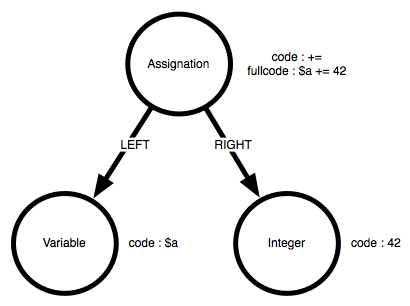
To define a pattern in the code, we use a combinaison of filters on atom, links or their property. Any succession of steps that yield a result means that an issue has been found in the code.
13.5.2. Atoms¶
Here is the list of the 117 available atoms :
- Addition : An addition or a substraction
- Analysis : An analysis, as processed by Exakat.
- Array : Represents array access : $a[4], $this[‘a’][‘f’] and foo()[1][‘g’]
- Arrayappend : Represents $a[] or $this->b[]
- Arrayliteral : Represents an array definition : [4,5 => 3,6] and array(1,2,3)
- As : The as keyword, when aliasing an imported class
- Assignation : Any assignation and short assignation : $a = 1, $b .= 3
- Bitshift : A bit shift operation on integers, with << or >>
- Block : Represents a sequence between curly braces. For example, { $c += $b; }.
- Boolean : Represents true or false.
- Break : A break, with or without the level indication. break 1;
- Cast : A case expression in a switch() statement. `case 1: `
- Cast : A cast operation, like
(array)or(unset) - Catch : A catch clause in a try/catch command. For example : catch (Exception $e) or catch{A|B|C $d}
- Class : A named class.
- Classalias : A call to the class_alias function.
- Classanonymous : A unnamed class, created with new class {};
- Clone : A clone expression
- Closure : A closure definition. For example, function () { return 3; }.
- Coalesce : An expression with the coalesce operator, ?:. For example, $x = $y ?: ‘ef’;
- Comparison : A comparison, with any kind of comparison operator : ==, ===, >, …
- Concatenation : A concatenation : a sequence of values, linked by the dot operator .
- Const : A constant definition, for classes or global. const X = 1; or class x { const Y = 2; }
- Constant : A constant definition, part of a Const atom.
- Continue : A continue operator, with or without its level indicator
- Declare : A declare expression.
- Declaredefinition : One configuration expression inside a declare definition. For example, in declare(strict_types=1);, strict_types=1
- Default : A default case, in a switch statement.
- Defineconstant : A call to the define() function.
- Dowhile : A do…while() loop.
- Echo : A call to echo
- Empty : A call to empty
- Eval : A call to Eval
- Exit : A call to Exit
- File : A file, containing the PHP source code.
- Finally : A finally clause in a try/catch command.
- For : A for loop. For example : for($i = 0; $i < 10; ++$i) { }
- Foreach : A foreach loop.
- Function : A function definition
- Functioncall : A call to a function.
- Global : An expression with the global keyword. For example, global $x, $y.
- Globaldefinition : A definition of a global variable, inside a global expression. For example, in global $x = 1, $y, $x = 1 and $y are Globaldefinition.
- Goto : The goto expression.
- Gotolabel : A target destination for a goto expression.
- Halt : The __halt_compiler command.
- Heredoc : A Heredoc or Nowdoc string
- Identifier : A name for a constant or a class. For example : $x instanceof Y, ‘echo PHP_INT_MAX`, new Y
- Ifthen : A if/then/else structure.
- Include : A inclusion, with require or include, with _once or not.
- Inlinehtml : Raw text, in the middle of a PHP script. For example : ``++$a; ?>RAW TEXT<?php ++$b; ``
- Instanceof : A instanceof expression
- Insteadof : A insteadof expression
- Integer : An Integer literal, positive or negative.
- Interface : An interface definition
- Isset : A call to isset
- Keyvalue : An expression with the => operator : for arrays or foreach() instructions.
- List : The list() or [] call when on the right of an assignation.
- Logical : A logical expression. This covers also bitwise operations. For example : $a | $b, $a && $b, $a xor $b.
- Magicconstant : A PHP magic constant. For example : __FILE__ or __class__.
- Magicmethod : A special PHP method in a class. For example, __clone(), __construct(), __get(), …
- Member : A reference to a member of an object. For example, $object->member.
- Method : A method definition in a class.
- Methodcall : A non-static call to a method. For example, $a->method();
- Methodcallname : The name of the method in a methodcall
- Multiplication : A multiplication *, division / or modulo % operation.
- Name : The name of a structure : name of a class, method, interface, trait, interface.
- Namespace : A namespace declaration
- New : An instantiation expression, with new ClassName().
- Newcall : The functioncall in a New expression. For example, in ``new foo()`, foo() is the Newcall.
- Not : A call to ! or ~.
- Nsname : A fully qualified name, including `. For example, `strtolower, ABC, …w
- Null : The Null value
- Parameter : A parameter definition, in a function or method definition. When called, it becomes an argument.
- Parametername : A Parametername
- Parent : The parent keyword, when it is used to refer to the parent class.
- Parenthesis : A Parenthesis expression. This is not a syntactic parenthesis, like in a switch or functioncall.
- Php : A PHP script, inside its tags. This exclude the following and previous raw text in a PHP file.
- Phpvariable : A PHP reserved variable, such as $_GET, $_POST, $GLOBALS, etc.
- Postplusplus : $i++` expression
- Power : The power operator, **.
- Ppp : A properties declaration, in a class or a trait. For example : private $x, $y = 2;
- Preplusplus : ++ or – when it is before the variable.
- Print : A call to the function print.
- Project : The project node : the root above all File.
- Propertydefinition : A property definition. For example :
class x { private $property = 1; var $x; } - Real : A float number
- Return : The return expression.
- Self : The self keyword, as used inside a class.
- Sequence : A virtual atom, that represents the sequence of expression, in a block.
- Shell : A shell, made with ticks `
- Sign : A Sign structure : when a -`or `+ has been added before another expression. For example - ($a + $b).
- Static : The static keyword, when it is used to refer to the current class.
- Staticclass : A call to ::class, with the syntax of a static constant. For example, X::class.
- Staticconstant : A staticconstant : TheClass::TheConstant
- Staticdefinition : A static variable definition, in a method or function. This is not a static property. For example ; function foo() { static $s; }.
- Staticmethod : A staticmethod name, when using trait and renaming a method. For example, trait t { use t2 { C::D as E; }}. C::D is a static method.
- Staticmethodcall : A static methodcall
- Staticproperty : A static property syntax. For example, A::$b or self::$d.
- Staticpropertyname : The name of a static property : not a variable.
- String : A string literal, with or without interpolation. For example, ‘$x’, “a{$y}”, “a”.
- Switch : A switch structure.
- Ternary : The ternary operator : $a ? $b : ‘c’.
- This : The special variable $this.
- Throw : A throw expression
- Trait : A trait. For example : trait t { function foo() {} }
- Try : The Try part in a try/catch/finally expression.
- Unset : A call to unset
- Usenamespace : Use expression within a namespace, and not in a class or trait.
- Usetrait : A use expression, when used to import a trait. For exapmle, class x { use t; }
- Variable : A Variable, as a standalone container. For example : $a = 1 or $b += 3. Variables in arrays are Variablearray, while variables in objects are Variableobject.
- Variablearray : A variable, when used to build an array syntax. For example, the $x in $x[0] or $x[].
- Variabledefinition : A placeholder to federate local variable definition in a method.
- Variableobject : A variable when used with the -> operator.
- Void : A Void operation. It represents the absence of data. For example : foo();; : there is a Void as argument, and one between the semicolons.
- While : A While structure, different from a Dowhile structure. For example : while($a < 10) { $a++;}
- Yield : A yield expression
- Yieldfrom : A yield from expression
13.5.2.1. Addition¶
An addition or a substraction

List of available properties :
- boolean
- code
- constant
- ctype1
- ctype1_size
- fullcode
- intval
- lccode
- line
- noDelimiter
- rank
List of possible tokens :
- T_MINUS
- T_PLUS
List of outgoing links :
- LEFT
- RIGHT
List of incoming links :
- ANALYZED
- ARGUMENT
- CODE
- CONCAT
- CONDITION
- DEFAULT
- ELSE
- EXPRESSION
- INDEX
- LEFT
- RETURN
- RIGHT
- SOURCE
- THEN
- VALUE
13.5.2.2. Analysis¶
An analysis, as processed by Exakat.

List of available properties :
- Atom
- analyzer
- atom
List of possible tokens :
List of outgoing links :
- ANALYZED
List of incoming links :
13.5.2.3. Array¶
Represents array access : $a[4], $this[‘a’][‘f’] and foo()[1][‘g’]
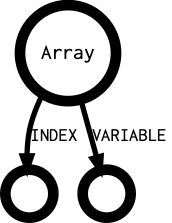
List of available properties :
- code
- ctype1
- ctype1_size
- enclosing
- fullcode
- globalvar
- lccode
- line
- noDelimiter
- noscream
- rank
- reference
- variadic
List of possible tokens :
- T_CLOSE_BRACKET
- T_CLOSE_CURLY
- T_CLOSE_PARENTHESIS
- T_CONSTANT_ENCAPSED_STRING
- T_CURLY_OPEN
- T_QUOTE
- T_START_HEREDOC
- T_STRING
- T_STRING_VARNAME
- T_VARIABLE
List of outgoing links :
- INDEX
- VARIABLE
List of incoming links :
- ANALYZED
- APPEND
- ARGUMENT
- CASE
- CAST
- CLASS
- CLONE
- CODE
- CONCAT
- CONDITION
- DEFAULT
- ELSE
- EXPRESSION
- INDEX
- LEFT
- NAME
- NEW
- NOT
- OBJECT
- POSTPLUSPLUS
- PREPLUSPLUS
- RETURN
- RIGHT
- SIGN
- SOURCE
- THEN
- THROW
- VALUE
- VARIABLE
13.5.2.4. Arrayappend¶
Represents $a[] or $this->b[]
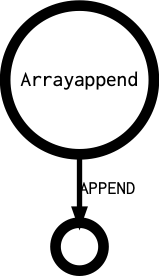
List of available properties :
- code
- ctype1
- ctype1_size
- fullcode
- lccode
- line
- rank
- reference
List of possible tokens :
- T_CLOSE_BRACKET
- T_CLOSE_CURLY
- T_CLOSE_PARENTHESIS
- T_STRING
- T_VARIABLE
List of outgoing links :
- APPEND
List of incoming links :
- APPEND
- ARGUMENT
- LEFT
- OBJECT
- POSTPLUSPLUS
- PREPLUSPLUS
- RETURN
- RIGHT
- VALUE
- VARIABLE
- YIELD
13.5.2.5. Arrayliteral¶
Represents an array definition : [4,5 => 3,6] and array(1,2,3)
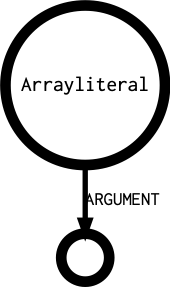
List of available properties :
- args_max
- args_min
- boolean
- cbClass
- cbMethod
- cbObject
- code
- constant
- count
- ctype1
- ctype1_size
- fullcode
- intval
- lccode
- line
- noDelimiter
- noscream
- rank
- variadic
List of possible tokens :
- T_ARRAY
- T_OPEN_BRACKET
List of outgoing links :
- ARGUMENT
List of incoming links :
- ANALYZED
- ARGUMENT
- CASE
- CAST
- CLONE
- CODE
- DEFAULT
- DEFINITION
- ELSE
- EXPRESSION
- INDEX
- LEFT
- NAME
- OBJECT
- RETURN
- RIGHT
- SOURCE
- THEN
- VALUE
- VARIABLE
- YIELD
13.5.2.6. As¶
The as keyword, when aliasing an imported class
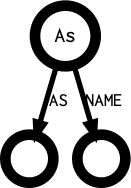
List of available properties :
- alias
- code
- ctype1_size
- fullcode
- fullnspath
- lccode
- line
- rank
- visibility
List of possible tokens :
- T_AS
List of outgoing links :
- AS
- DEFINITION
- NAME
List of incoming links :
- ANALYZED
- DEFINITION
- EXPRESSION
- USE
13.5.2.7. Assignation¶
Any assignation and short assignation : $a = 1, $b .= 3

List of available properties :
- code
- ctype1
- ctype1_size
- fullcode
- lccode
- line
- rank
List of possible tokens :
- T_AND_EQUAL
- T_CONCAT_EQUAL
- T_DIV_EQUAL
- T_EQUAL
- T_MINUS_EQUAL
- T_MOD_EQUAL
- T_MUL_EQUAL
- T_OR_EQUAL
- T_PLUS_EQUAL
- T_POW_EQUAL
- T_SL_EQUAL
- T_SR_EQUAL
- T_XOR_EQUAL
List of outgoing links :
- LEFT
- RIGHT
List of incoming links :
- ANALYZED
- ARGUMENT
- CODE
- CONDITION
- ELSE
- EXPRESSION
- INDEX
- LEFT
- NAME
- RETURN
- RIGHT
- SOURCE
- THEN
- THROW
- VALUE
13.5.2.8. Bitshift¶
A bit shift operation on integers, with << or >>

List of available properties :
- boolean
- code
- constant
- ctype1
- ctype1_size
- fullcode
- intval
- lccode
- line
- noDelimiter
- rank
List of possible tokens :
- T_SL
- T_SR
List of outgoing links :
- LEFT
- RIGHT
List of incoming links :
- ANALYZED
- ARGUMENT
- CODE
- CONDITION
- DEFAULT
- LEFT
- RETURN
- RIGHT
- VALUE
13.5.2.9. Block¶
Represents a sequence between curly braces. For example, { $c += $b; }.
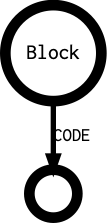
List of available properties :
- code
- ctype1_size
- fullcode
- lccode
- line
List of possible tokens :
- T_CLOSE_BRACKET
- T_CLOSE_CURLY
- T_CLOSE_PARENTHESIS
- T_CONSTANT_ENCAPSED_STRING
- T_LNUMBER
- T_QUOTE
- T_STRING
- T_VARIABLE
List of outgoing links :
- CODE
List of incoming links :
- MEMBER
- NAME
13.5.2.10. Boolean¶
Represents true or false.
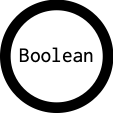
List of available properties :
- boolean
- code
- constant
- ctype1
- ctype1_size
- fullcode
- fullnspath
- intval
- lccode
- line
- noDelimiter
- rank
List of possible tokens :
- T_STRING
List of outgoing links :
List of incoming links :
- ANALYZED
- ARGUMENT
- CASE
- CODE
- CONCAT
- CONDITION
- DEFAULT
- ELSE
- EXPRESSION
- INDEX
- LEFT
- RETURN
- RIGHT
- THEN
- VALUE
13.5.2.11. Break¶
A break, with or without the level indication. break 1;

List of available properties :
- code
- ctype1
- ctype1_size
- fullcode
- lccode
- line
- rank
List of possible tokens :
- T_BREAK
List of outgoing links :
- BREAK
List of incoming links :
- EXPRESSION
13.5.2.12. Cast¶
A case expression in a switch() statement. `case 1: `
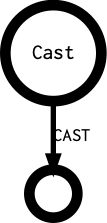
List of available properties :
- code
- ctype1
- ctype1_size
- fullcode
- lccode
- line
- rank
List of possible tokens :
- T_CASE
List of outgoing links :
- CASE
- CODE
List of incoming links :
- ANALYZED
- EXPRESSION
13.5.2.13. Cast¶
A cast operation, like (array) or (unset)

List of available properties :
- binaryString
- code
- ctype1
- ctype1_size
- fullcode
- lccode
- line
- rank
List of possible tokens :
- T_ARRAY_CAST
- T_BOOL_CAST
- T_DOUBLE_CAST
- T_INT_CAST
- T_OBJECT_CAST
- T_STRING_CAST
List of outgoing links :
- CAST
List of incoming links :
- ANALYZED
- ARGUMENT
- CAST
- CODE
- CONCAT
- CONDITION
- ELSE
- EXPRESSION
- INDEX
- LEFT
- NAME
- POSTPLUSPLUS
- RETURN
- RIGHT
- SIGN
- SOURCE
- THEN
- VALUE
- YIELD
13.5.2.14. Catch¶
A catch clause in a try/catch command. For example : catch (Exception $e) or catch{A|B|C $d}
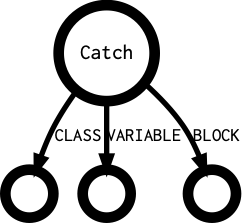
List of available properties :
- code
- count
- ctype1
- ctype1_size
- fullcode
- lccode
- line
- rank
List of possible tokens :
- T_TRY
- 1
List of outgoing links :
- BLOCK
- CLASS
- VARIABLE
List of incoming links :
- ANALYZED
- CATCH
13.5.2.15. Class¶
A named class.
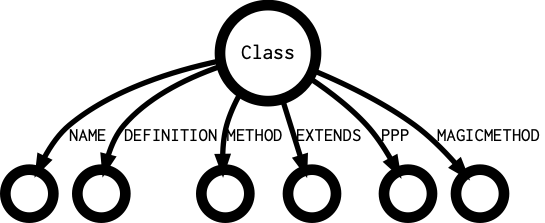
List of available properties :
- abstract
- aliased
- code
- ctype1_size
- final
- fullcode
- fullnspath
- lccode
- line
- rank
List of possible tokens :
- T_CLASS
- 1
List of outgoing links :
- CONST
- DEFINITION
- EXTENDS
- IMPLEMENTS
- MAGICMETHOD
- METHOD
- NAME
- PPP
- USE
List of incoming links :
- ANALYZED
- EXPRESSION
13.5.2.16. Classalias¶
A call to the class_alias function.

List of available properties :
- args_max
- args_min
- code
- constant
- count
- ctype1
- ctype1_size
- fullcode
- fullnspath
- lccode
- line
- rank
List of possible tokens :
- T_STRING
List of outgoing links :
- ARGUMENT
- NAME
List of incoming links :
- ANALYZED
- EXPRESSION
- RIGHT
13.5.2.17. Classanonymous¶
A unnamed class, created with new class {};
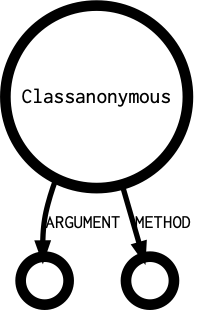
List of available properties :
- args_max
- args_min
- code
- count
- ctype1
- ctype1_size
- fullcode
- fullnspath
- lccode
- line
List of possible tokens :
- T_CLASS
List of outgoing links :
- ARGUMENT
- DEFINITION
- EXTENDS
- IMPLEMENTS
- MAGICMETHOD
- METHOD
- PPP
- USE
List of incoming links :
- ANALYZED
- NEW
13.5.2.18. Clone¶
A clone expression
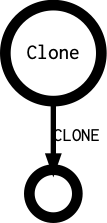
List of available properties :
- code
- ctype1
- ctype1_size
- fullcode
- lccode
- line
- noscream
- rank
List of possible tokens :
- T_CLONE
List of outgoing links :
- CLONE
List of incoming links :
- ANALYZED
- ARGUMENT
- CLONE
- CODE
- ELSE
- EXPRESSION
- LEFT
- RETURN
- RIGHT
- SOURCE
- THEN
13.5.2.19. Closure¶
A closure definition. For example, function () { return 3; }.

List of available properties :
- args_max
- args_min
- boolean
- code
- constant
- count
- ctype1
- ctype1_size
- fullcode
- fullnspath
- lccode
- line
- noscream
- nullable
- rank
- reference
- static
List of possible tokens :
- T_FUNCTION
List of outgoing links :
- ARGUMENT
- BLOCK
- DEFINITION
- RETURNED
- RETURNTYPE
- USE
List of incoming links :
- ANALYZED
- ARGUMENT
- CAST
- CODE
- ELSE
- INDEX
- RETURN
- RIGHT
- SOURCE
- THEN
- VALUE
- VARIABLE
13.5.2.20. Coalesce¶
An expression with the coalesce operator, ?:. For example, $x = $y ?: ‘ef’;
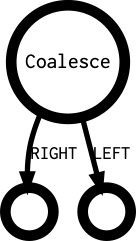
List of available properties :
- code
- ctype1
- ctype1_size
- fullcode
- intval
- isNull
- lccode
- line
- noDelimiter
- rank
List of possible tokens :
- T_COALESCE
List of outgoing links :
- LEFT
- RIGHT
List of incoming links :
- ARGUMENT
- CODE
- CONDITION
- DEFAULT
- RETURN
- RIGHT
- SOURCE
- THEN
- VALUE
13.5.2.21. Comparison¶
A comparison, with any kind of comparison operator : ==, ===, >, …

List of available properties :
- boolean
- code
- constant
- ctype1
- ctype1_size
- fullcode
- intval
- lccode
- line
- noDelimiter
- rank
List of possible tokens :
- T_GREATER
- T_IS_EQUAL
- T_IS_GREATER_OR_EQUAL
- T_IS_IDENTICAL
- T_IS_NOT_EQUAL
- T_IS_NOT_IDENTICAL
- T_IS_SMALLER_OR_EQUAL
- T_SMALLER
- T_SPACESHIP
List of outgoing links :
- LEFT
- RIGHT
List of incoming links :
- ANALYZED
- ARGUMENT
- CASE
- CODE
- CONDITION
- ELSE
- EXPRESSION
- INDEX
- LEFT
- RETURN
- RIGHT
- THEN
- VALUE
13.5.2.22. Concatenation¶
A concatenation : a sequence of values, linked by the dot operator .

List of available properties :
- boolean
- code
- constant
- count
- ctype1
- ctype1_size
- fullcode
- fullnspath
- intval
- lccode
- line
- noDelimiter
- rank
List of possible tokens :
- T_DOT
List of outgoing links :
- CONCAT
List of incoming links :
- ANALYZED
- ARGUMENT
- CASE
- CODE
- CONDITION
- DEFAULT
- ELSE
- EXPRESSION
- INDEX
- LEFT
- NAME
- RETURN
- RIGHT
- THEN
- THROW
- VALUE
13.5.2.23. Const¶
A constant definition, for classes or global. const X = 1; or class x { const Y = 2; }

List of available properties :
- code
- count
- ctype1_size
- fullcode
- lccode
- line
- rank
- visibility
List of possible tokens :
- T_CONST
- 1
List of outgoing links :
- CONST
List of incoming links :
- ANALYZED
- CONST
- EXPRESSION
13.5.2.24. Constant¶
A constant definition, part of a Const atom.
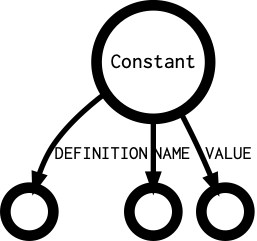
List of available properties :
- boolean
- code
- ctype1
- ctype1_size
- fullcode
- intval
- isNull
- lccode
- line
- rank
List of possible tokens :
- T_COMMA
- T_CONST
- 1
List of outgoing links :
- DEFINITION
- NAME
- OVERWRITE
- VALUE
List of incoming links :
- ANALYZED
- CONST
- OVERWRITE
13.5.2.25. Continue¶
A continue operator, with or without its level indicator

List of available properties :
- code
- ctype1
- ctype1_size
- fullcode
- lccode
- line
- rank
List of possible tokens :
- T_CONTINUE
List of outgoing links :
- CONTINUE
List of incoming links :
- ANALYZED
- EXPRESSION
13.5.2.26. Declare¶
A declare expression.
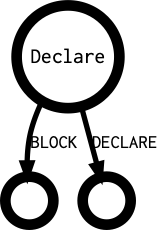
List of available properties :
- code
- ctype1_size
- fullcode
- lccode
- line
- rank
List of possible tokens :
- T_DECLARE
List of outgoing links :
- BLOCK
- DECLARE
List of incoming links :
- ANALYZED
- EXPRESSION
13.5.2.27. Declaredefinition¶
One configuration expression inside a declare definition. For example, in declare(strict_types=1);, strict_types=1
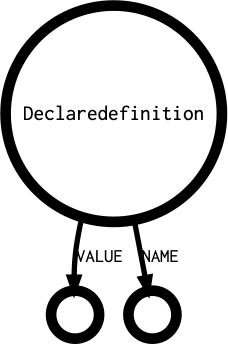
List of available properties :
- code
- ctype1_size
- fullcode
- lccode
- line
List of possible tokens :
List of outgoing links :
- NAME
- VALUE
List of incoming links :
- DECLARE
13.5.2.28. Default¶
A default case, in a switch statement.

List of available properties :
- code
- ctype1
- ctype1_size
- fullcode
- lccode
- line
- rank
List of possible tokens :
- T_DEFAULT
List of outgoing links :
- CODE
List of incoming links :
- EXPRESSION
13.5.2.29. Defineconstant¶
A call to the define() function.
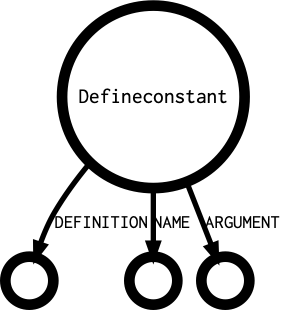
List of available properties :
- args_max
- args_min
- code
- count
- ctype1
- ctype1_size
- fullcode
- fullnspath
- lccode
- line
- rank
List of possible tokens :
- T_STRING
List of outgoing links :
- ARGUMENT
- DEFINITION
- NAME
List of incoming links :
- ANALYZED
- ARGUMENT
- EXPRESSION
- RIGHT
13.5.2.30. Dowhile¶
A do…while() loop.
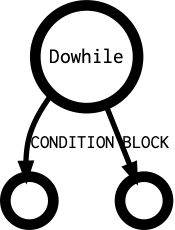
List of available properties :
- code
- ctype1
- ctype1_size
- fullcode
- lccode
- line
- rank
List of possible tokens :
- T_DO
List of outgoing links :
- BLOCK
- CONDITION
List of incoming links :
- ANALYZED
- EXPRESSION
13.5.2.31. Echo¶
A call to echo

List of available properties :
- args_max
- args_min
- code
- count
- ctype1
- ctype1_size
- fullcode
- fullnspath
- lccode
- line
- rank
List of possible tokens :
- T_ECHO
- T_OPEN_TAG_WITH_ECHO
- 1
List of outgoing links :
- ARGUMENT
- NAME
List of incoming links :
- ANALYZED
- EXPRESSION
13.5.2.32. Empty¶
A call to empty

List of available properties :
- args_max
- args_min
- code
- count
- ctype1
- ctype1_size
- fullcode
- fullnspath
- lccode
- line
- rank
List of possible tokens :
- T_EMPTY
List of outgoing links :
- ARGUMENT
List of incoming links :
- ANALYZED
- ARGUMENT
- CODE
- CONDITION
- LEFT
- NOT
- RETURN
- RIGHT
- VALUE
13.5.2.33. Eval¶
A call to Eval
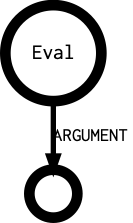
List of available properties :
- args_max
- args_min
- code
- count
- ctype1
- ctype1_size
- fullcode
- fullnspath
- lccode
- line
- noscream
- rank
List of possible tokens :
- T_EVAL
List of outgoing links :
- ARGUMENT
List of incoming links :
- ANALYZED
- ARGUMENT
- CODE
- EXPRESSION
- NOT
- RETURN
- RIGHT
13.5.2.34. Exit¶
A call to Exit
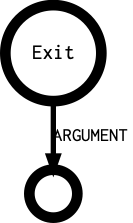
List of available properties :
- args_max
- args_min
- code
- count
- ctype1
- ctype1_size
- fullcode
- fullnspath
- lccode
- line
- rank
List of possible tokens :
- T_COMMA
- T_EXIT
- T_OPEN_PARENTHESIS
List of outgoing links :
- ARGUMENT
List of incoming links :
- ANALYZED
- EXPRESSION
- RIGHT
13.5.2.35. File¶
A file, containing the PHP source code.
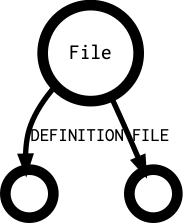
List of available properties :
- code
- ctype1_size
- fullcode
- lccode
- line
List of possible tokens :
- T_FILENAME
List of outgoing links :
- DEFINITION
- FILE
List of incoming links :
- ANALYZED
- PROJECT
13.5.2.36. Finally¶
A finally clause in a try/catch command.

List of available properties :
- code
- ctype1
- ctype1_size
- fullcode
- lccode
- line
List of possible tokens :
- T_TRY
List of outgoing links :
- BLOCK
List of incoming links :
- FINALLY
13.5.2.37. For¶
A for loop. For example : for($i = 0; $i < 10; ++$i) { }
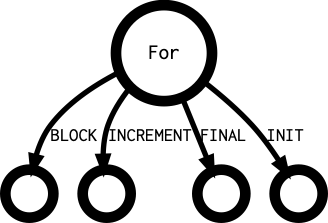
List of available properties :
- alternative
- code
- ctype1
- ctype1_size
- fullcode
- lccode
- line
- rank
List of possible tokens :
- T_CLOSE_CURLY
- T_OPEN_TAG
- T_SEMICOLON
- 1
List of outgoing links :
- BLOCK
- FINAL
- INCREMENT
- INIT
List of incoming links :
- ANALYZED
- EXPRESSION
13.5.2.38. Foreach¶
A foreach loop.
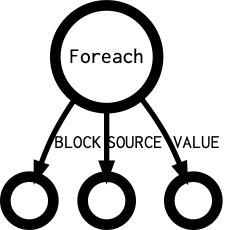
List of available properties :
- alternative
- code
- ctype1
- ctype1_size
- fullcode
- lccode
- line
- rank
List of possible tokens :
- T_FOREACH
List of outgoing links :
- BLOCK
- SOURCE
- VALUE
List of incoming links :
- ANALYZED
- EXPRESSION
13.5.2.39. Function¶
A function definition
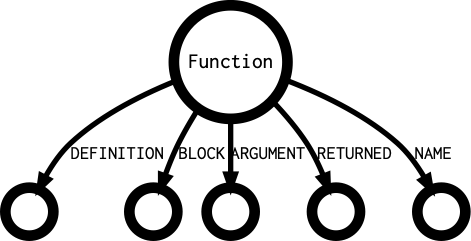
List of available properties :
- args_max
- args_min
- code
- count
- ctype1
- ctype1_size
- fullcode
- fullnspath
- lccode
- line
- nullable
- rank
- reference
List of possible tokens :
- T_FUNCTION
List of outgoing links :
- ARGUMENT
- BLOCK
- DEFINITION
- NAME
- RETURNED
- RETURNTYPE
List of incoming links :
- ANALYZED
- EXPRESSION
13.5.2.40. Functioncall¶
A call to a function.
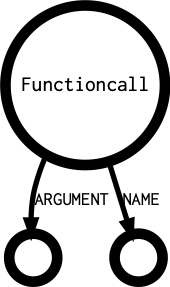
List of available properties :
- aliased
- args_max
- args_min
- code
- constant
- count
- ctype1
- ctype1_size
- enclosing
- fullcode
- fullnspath
- lccode
- line
- noDelimiter
- noscream
- rank
- reference
- variadic
List of possible tokens :
- T_CLOSE_BRACKET
- T_CLOSE_PARENTHESIS
- T_CONSTANT_ENCAPSED_STRING
- T_CURLY_OPEN
- T_DOLLAR
- T_DOUBLE_COLON
- T_NS_SEPARATOR
- T_OBJECT_OPERATOR
- T_OPEN_BRACKET
- T_OPEN_PARENTHESIS
- T_STRING
- T_VARIABLE
List of outgoing links :
- ARGUMENT
- NAME
List of incoming links :
- ANALYZED
- APPEND
- ARGUMENT
- CASE
- CAST
- CODE
- CONCAT
- CONDITION
- DEFINITION
- ELSE
- EXPRESSION
- INDEX
- LEFT
- NAME
- NEW
- NOT
- OBJECT
- RETURN
- RIGHT
- SIGN
- SOURCE
- THEN
- THROW
- VALUE
- VARIABLE
- YIELD
13.5.2.41. Global¶
An expression with the global keyword. For example, global $x, $y.

List of available properties :
- code
- count
- ctype1
- ctype1_size
- fullcode
- lccode
- line
- rank
List of possible tokens :
- T_GLOBAL
List of outgoing links :
- GLOBAL
List of incoming links :
- ANALYZED
- EXPRESSION
13.5.2.42. Globaldefinition¶
A definition of a global variable, inside a global expression. For example, in global $x = 1, $y, $x = 1 and $y are Globaldefinition.
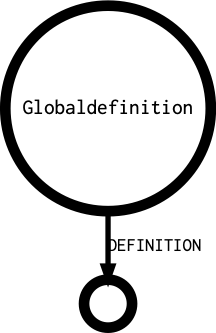
List of available properties :
- code
- ctype1
- ctype1_size
- fullcode
- lccode
- line
- rank
List of possible tokens :
- T_VARIABLE
List of outgoing links :
- DEFINITION
List of incoming links :
- ANALYZED
- DEFINITION
- GLOBAL
13.5.2.43. Goto¶
The goto expression.
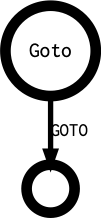
List of available properties :
- code
- ctype1
- ctype1_size
- fullcode
- lccode
- line
- rank
List of possible tokens :
- T_GOTO
List of outgoing links :
- GOTO
List of incoming links :
- DEFINITION
- EXPRESSION
13.5.2.44. Gotolabel¶
A target destination for a goto expression.
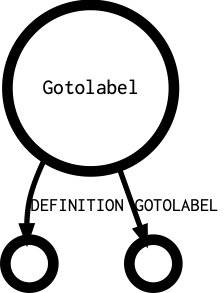
List of available properties :
- code
- ctype1_size
- fullcode
- lccode
- line
- rank
List of possible tokens :
- T_COLON
List of outgoing links :
- DEFINITION
- GOTOLABEL
List of incoming links :
- EXPRESSION
13.5.2.45. Halt¶
The __halt_compiler command.

List of available properties :
- code
- ctype1_size
- fullcode
- lccode
- line
- rank
List of possible tokens :
- T_HALT_COMPILER
List of outgoing links :
List of incoming links :
- EXPRESSION
13.5.2.46. Heredoc¶
A Heredoc or Nowdoc string
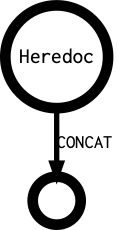
List of available properties :
- binaryString
- boolean
- code
- count
- ctype1
- ctype1_size
- delimiter
- fullcode
- heredoc
- intval
- lccode
- line
- noDelimiter
- rank
List of possible tokens :
- T_START_HEREDOC
List of outgoing links :
- CONCAT
List of incoming links :
- ANALYZED
- ARGUMENT
- CONCAT
- DEFAULT
- RETURN
- RIGHT
- VALUE
13.5.2.47. Identifier¶
A name for a constant or a class. For example : $x instanceof Y, ‘echo PHP_INT_MAX`, new Y

List of available properties :
- aliased
- boolean
- code
- constant
- ctype1
- ctype1_size
- fullcode
- fullnspath
- intval
- isNull
- lccode
- line
- noDelimiter
- noscream
- rank
- reference
List of possible tokens :
- T_ARRAY
- T_CALLABLE
- T_CONST
- T_FUNCTION
- T_STRING
List of outgoing links :
- DEFINITION
List of incoming links :
- ANALYZED
- ARGUMENT
- AS
- CASE
- CAST
- CLASS
- CODE
- CONCAT
- CONDITION
- CONST
- DEFAULT
- DEFINITION
- ELSE
- EXPRESSION
- FUNCTION
- INDEX
- INSTEADOF
- LEFT
- MEMBER
- NAME
- NEW
- NOT
- RETURN
- RIGHT
- SIGN
- THEN
- TYPEHINT
- VALUE
- VARIABLE
13.5.2.48. Ifthen¶
A if/then/else structure.
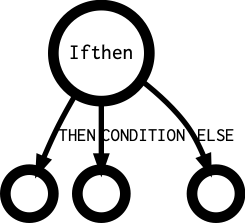
List of available properties :
- alternative
- code
- ctype1
- ctype1_size
- fullcode
- lccode
- line
- rank
List of possible tokens :
- T_ELSEIF
- T_IF
List of outgoing links :
- CONDITION
- ELSE
- THEN
List of incoming links :
- ANALYZED
- ELSE
- EXPRESSION
13.5.2.49. Include¶
A inclusion, with require or include, with _once or not.
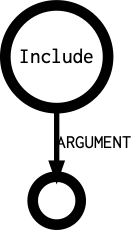
List of available properties :
- code
- count
- ctype1
- ctype1_size
- fullcode
- fullnspath
- lccode
- line
- noscream
- rank
List of possible tokens :
- T_INCLUDE
- T_INCLUDE_ONCE
- T_REQUIRE
- T_REQUIRE_ONCE
List of outgoing links :
- ARGUMENT
List of incoming links :
- ANALYZED
- ARGUMENT
- CODE
- CONDITION
- EXPRESSION
- NOT
- RETURN
- RIGHT
- THEN
13.5.2.50. Inlinehtml¶
Raw text, in the middle of a PHP script. For example : ``++$a; ?>RAW TEXT<?php ++$b; ``

List of available properties :
- code
- ctype1_size
- fullcode
- lccode
- line
- rank
List of possible tokens :
- T_INLINE_HTML
- 1
List of outgoing links :
List of incoming links :
- ANALYZED
- EXPRESSION
13.5.2.51. Instanceof¶
A instanceof expression
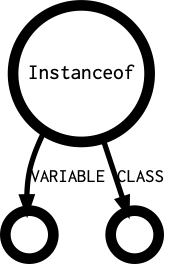
List of available properties :
- code
- ctype1
- ctype1_size
- fullcode
- lccode
- line
- rank
List of possible tokens :
- T_INSTANCEOF
List of outgoing links :
- CLASS
- VARIABLE
List of incoming links :
- ANALYZED
- ARGUMENT
- CASE
- CODE
- CONDITION
- INDEX
- LEFT
- NOT
- RETURN
- RIGHT
13.5.2.52. Insteadof¶
A insteadof expression
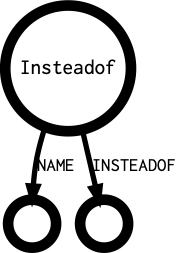
List of available properties :
- code
- ctype1
- ctype1_size
- fullcode
- lccode
- line
- rank
List of possible tokens :
- T_INSTEADOF
List of outgoing links :
- INSTEADOF
- NAME
List of incoming links :
- EXPRESSION
13.5.2.53. Integer¶
An Integer literal, positive or negative.
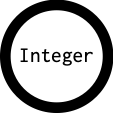
List of available properties :
- boolean
- code
- constant
- ctype1
- ctype1_size
- fullcode
- fullnspath
- intval
- lccode
- line
- noDelimiter
- rank
- variadic
List of possible tokens :
- T_LNUMBER
- T_NUM_STRING
List of outgoing links :
List of incoming links :
- ANALYZED
- ARGUMENT
- BREAK
- CASE
- CAST
- CLONE
- CODE
- CONCAT
- CONDITION
- CONTINUE
- DEFAULT
- ELSE
- INDEX
- LEFT
- NAME
- NOT
- RETURN
- RIGHT
- THEN
- THROW
- VALUE
- YIELD
13.5.2.54. Interface¶
An interface definition
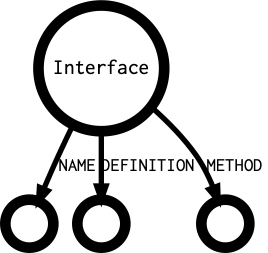
List of available properties :
- code
- ctype1_size
- fullcode
- fullnspath
- lccode
- line
- rank
List of possible tokens :
- T_INTERFACE
List of outgoing links :
- CONST
- DEFINITION
- EXTENDS
- MAGICMETHOD
- METHOD
- NAME
List of incoming links :
- ANALYZED
- EXPRESSION
13.5.2.55. Isset¶
A call to isset
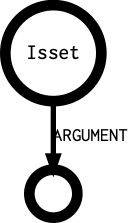
List of available properties :
- args_max
- args_min
- code
- count
- ctype1
- ctype1_size
- fullcode
- fullnspath
- lccode
- line
- rank
List of possible tokens :
- T_ISSET
List of outgoing links :
- ARGUMENT
List of incoming links :
- ANALYZED
- ARGUMENT
- CASE
- CODE
- CONDITION
- EXPRESSION
- LEFT
- NOT
- RETURN
- RIGHT
13.5.2.56. Keyvalue¶
An expression with the => operator : for arrays or foreach() instructions.

List of available properties :
- boolean
- code
- constant
- ctype1
- ctype1_size
- fullcode
- lccode
- line
- rank
List of possible tokens :
- T_DOUBLE_ARROW
List of outgoing links :
- INDEX
- VALUE
List of incoming links :
- ARGUMENT
- VALUE
- YIELD
13.5.2.57. List¶
The list() or [] call when on the right of an assignation.
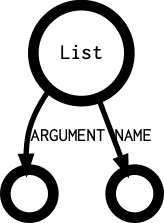
List of available properties :
- args_max
- args_min
- code
- count
- ctype1
- ctype1_size
- fullcode
- fullnspath
- lccode
- line
- noscream
- rank
List of possible tokens :
- T_LIST
- T_OPEN_BRACKET
List of outgoing links :
- ARGUMENT
- NAME
List of incoming links :
- ANALYZED
- ARGUMENT
- LEFT
- VALUE
13.5.2.58. Logical¶
A logical expression. This covers also bitwise operations. For example : $a | $b, $a && $b, $a xor $b.

List of available properties :
- boolean
- code
- constant
- ctype1
- ctype1_size
- fullcode
- intval
- lccode
- line
- noDelimiter
- rank
List of possible tokens :
- T_AND
- T_BOOLEAN_AND
- T_BOOLEAN_OR
- T_LOGICAL_AND
- T_LOGICAL_OR
- T_LOGICAL_XOR
- T_OR
- T_XOR
List of outgoing links :
- LEFT
- RIGHT
List of incoming links :
- ANALYZED
- ARGUMENT
- CASE
- CODE
- CONDITION
- DEFAULT
- ELSE
- EXPRESSION
- INDEX
- LEFT
- RETURN
- RIGHT
- THEN
- VALUE
13.5.2.59. Magicconstant¶
A PHP magic constant. For example : __FILE__ or __class__.

List of available properties :
- boolean
- code
- ctype1
- ctype1_size
- fullcode
- intval
- lccode
- line
- noDelimiter
- rank
List of possible tokens :
- T_CLASS_C
- T_DIR
- T_FILE
- T_FUNC_C
- T_LINE
- T_METHOD_C
- T_NS_C
- T_TRAIT_C
- 1
List of outgoing links :
List of incoming links :
- ANALYZED
- ARGUMENT
- CODE
- CONCAT
- DEFAULT
- ELSE
- INDEX
- LEFT
- RETURN
- RIGHT
- THEN
- VALUE
13.5.2.60. Magicmethod¶
A special PHP method in a class. For example, __clone(), __construct(), __get(), …
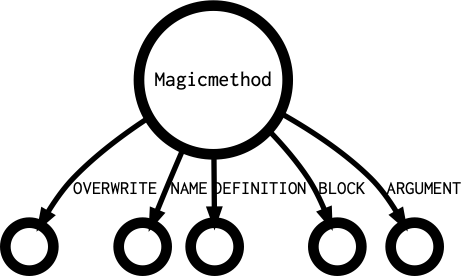
List of available properties :
- abstract
- args_max
- args_min
- code
- count
- ctype1
- ctype1_size
- final
- fullcode
- fullnspath
- lccode
- line
- rank
- static
- visibility
List of possible tokens :
- T_FUNCTION
- 1
List of outgoing links :
- ARGUMENT
- BLOCK
- DEFINITION
- NAME
- OVERWRITE
- RETURNED
- RETURNTYPE
List of incoming links :
- ANALYZED
- MAGICMETHOD
- OVERWRITE
13.5.2.61. Member¶
A reference to a member of an object. For example, $object->member.

List of available properties :
- code
- ctype1
- ctype1_size
- enclosing
- fullcode
- lccode
- line
- noDelimiter
- rank
List of possible tokens :
- T_CURLY_OPEN
- T_OBJECT_OPERATOR
- T_QUOTE
- T_START_HEREDOC
List of outgoing links :
- MEMBER
- OBJECT
List of incoming links :
- ANALYZED
- APPEND
- ARGUMENT
- CAST
- CLASS
- CLONE
- CODE
- CONCAT
- CONDITION
- DEFINITION
- ELSE
- EXPRESSION
- INDEX
- LEFT
- NAME
- NEW
- NOT
- OBJECT
- POSTPLUSPLUS
- PREPLUSPLUS
- RETURN
- RIGHT
- SIGN
- SOURCE
- THEN
- THROW
- VALUE
- VARIABLE
- YIELD
13.5.2.62. Method¶
A method definition in a class.
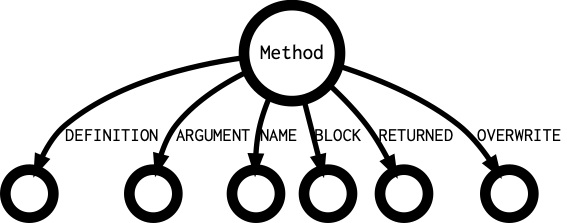
List of available properties :
- abstract
- args_max
- args_min
- code
- count
- ctype1
- ctype1_size
- final
- fullcode
- fullnspath
- lccode
- line
- nullable
- rank
- reference
- static
- visibility
List of possible tokens :
- T_FUNCTION
- 1
List of outgoing links :
- ARGUMENT
- BLOCK
- DEFINITION
- NAME
- OVERWRITE
- RETURNED
- RETURNTYPE
List of incoming links :
- ANALYZED
- METHOD
- OVERWRITE
13.5.2.63. Methodcall¶
A non-static call to a method. For example, $a->method();

List of available properties :
- code
- ctype1
- ctype1_size
- enclosing
- fullcode
- lccode
- line
- noDelimiter
- rank
- variadic
List of possible tokens :
- T_CURLY_OPEN
- T_OBJECT_OPERATOR
List of outgoing links :
- METHOD
- OBJECT
List of incoming links :
- ANALYZED
- APPEND
- ARGUMENT
- CASE
- CAST
- CLONE
- CODE
- CONCAT
- CONDITION
- DEFINITION
- ELSE
- EXPRESSION
- INDEX
- LEFT
- NAME
- NEW
- NOT
- OBJECT
- RETURN
- RIGHT
- SIGN
- SOURCE
- THEN
- THROW
- VALUE
- VARIABLE
- YIELD
13.5.2.64. Methodcallname¶
The name of the method in a methodcall
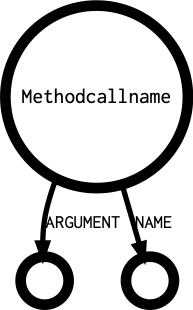
List of available properties :
- args_max
- args_min
- code
- count
- ctype1
- ctype1_size
- fullcode
- lccode
- line
List of possible tokens :
- T_CLOSE_BRACKET
- T_CONSTANT_ENCAPSED_STRING
- T_DOLLAR
- T_NEW
- T_STRING
- T_VARIABLE
List of outgoing links :
- ARGUMENT
- NAME
List of incoming links :
- ANALYZED
- METHOD
13.5.2.65. Multiplication¶
A multiplication *, division / or modulo % operation.
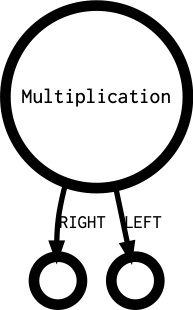
List of available properties :
- boolean
- code
- constant
- ctype1
- ctype1_size
- fullcode
- intval
- lccode
- line
- noDelimiter
- rank
List of possible tokens :
- T_PERCENTAGE
- T_SLASH
- T_STAR
List of outgoing links :
- LEFT
- RIGHT
List of incoming links :
- ANALYZED
- ARGUMENT
- CODE
- CONCAT
- CONDITION
- DEFAULT
- ELSE
- EXPRESSION
- INDEX
- LEFT
- RETURN
- RIGHT
- SIGN
- THEN
- VALUE
13.5.2.66. Name¶
The name of a structure : name of a class, method, interface, trait, interface.

List of available properties :
- aliased
- code
- ctype1
- ctype1_size
- fullcode
- fullnspath
- lccode
- line
List of possible tokens :
- T_ABSTRACT
- T_CLASS
- T_INSTANCEOF
- T_LIST
- T_NEW
- T_OPEN_TAG_WITH_ECHO
- T_PRINT
- T_PRIVATE
- T_PUBLIC
- T_STRING
- T_THROW
List of outgoing links :
- DEFINITION
List of incoming links :
- ANALYZED
- CONSTANT
- DEFINITION
- GOTO
- GOTOLABEL
- MEMBER
- METHOD
- NAME
13.5.2.67. Namespace¶
A namespace declaration
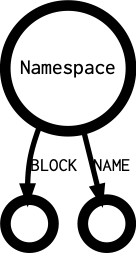
List of available properties :
- code
- ctype1_size
- fullcode
- fullnspath
- lccode
- line
- rank
List of possible tokens :
- T_NAMESPACE
List of outgoing links :
- BLOCK
- NAME
List of incoming links :
- ANALYZED
- EXPRESSION
13.5.2.68. New¶
An instantiation expression, with new ClassName().

List of available properties :
- code
- ctype1
- ctype1_size
- fullcode
- lccode
- line
- noscream
- rank
- variadic
List of possible tokens :
- T_NEW
List of outgoing links :
- NEW
List of incoming links :
- ANALYZED
- ARGUMENT
- CAST
- CLONE
- CODE
- CONCAT
- CONDITION
- DEFINITION
- ELSE
- EXPRESSION
- INDEX
- LEFT
- RETURN
- RIGHT
- SOURCE
- THEN
- THROW
- VALUE
- VARIABLE
- YIELD
13.5.2.69. Newcall¶
The functioncall in a New expression. For example, in ``new foo()`, foo() is the Newcall.
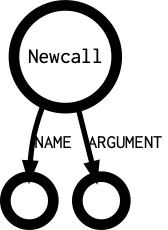
List of available properties :
- absolute
- aliased
- args_max
- args_min
- code
- count
- ctype1
- ctype1_size
- fullcode
- fullnspath
- lccode
- line
- noscream
- rank
List of possible tokens :
- T_DOLLAR
- T_LIST
- T_NS_SEPARATOR
- T_STATIC
- T_STRING
- T_VARIABLE
List of outgoing links :
- ARGUMENT
- DEFINITION
- NAME
List of incoming links :
- ANALYZED
- ARGUMENT
- CAST
- CLASS
- CODE
- CONCAT
- CONDITION
- DEFINITION
- ELSE
- EXPRESSION
- INDEX
- LEFT
- NAME
- NEW
- NOT
- OBJECT
- RETURN
- RIGHT
- SIGN
- THEN
- TYPEHINT
- VALUE
- VARIABLE
13.5.2.70. Not¶
A call to ! or ~.
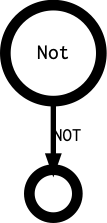
List of available properties :
- boolean
- code
- constant
- ctype1
- ctype1_size
- fullcode
- intval
- lccode
- line
- noDelimiter
- noscream
- rank
List of possible tokens :
- T_BANG
- T_TILDE
List of outgoing links :
- NOT
List of incoming links :
- ANALYZED
- ARGUMENT
- CASE
- CAST
- CODE
- CONDITION
- ELSE
- EXPRESSION
- LEFT
- NOT
- RETURN
- RIGHT
- THEN
- VALUE
13.5.2.71. Nsname¶
A fully qualified name, including `. For example, `strtolower, ABC, …w
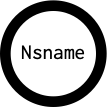
List of available properties :
- absolute
- alias
- boolean
- code
- constant
- ctype1
- ctype1_size
- fullcode
- fullnspath
- intval
- isNull
- lccode
- line
- noDelimiter
- origin
- rank
- reference
List of possible tokens :
- T_ARRAY
- T_CALLABLE
- T_NS_SEPARATOR
- T_STRING
- 1
List of outgoing links :
- DEFINITION
List of incoming links :
- ANALYZED
- ARGUMENT
- CLASS
- CONCAT
- DEFAULT
- DEFINITION
- EXTENDS
- IMPLEMENTS
- INDEX
- LEFT
- NAME
- NEW
- RETURNTYPE
- RIGHT
- TYPEHINT
- USE
- VALUE
13.5.2.72. Null¶
The Null value
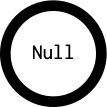
List of available properties :
- boolean
- code
- constant
- ctype1
- ctype1_size
- fullcode
- fullnspath
- intval
- isNull
- lccode
- line
- noDelimiter
- rank
- variadic
List of possible tokens :
- T_STRING
List of outgoing links :
List of incoming links :
- ANALYZED
- ARGUMENT
- CASE
- CAST
- CODE
- CONDITION
- DEFAULT
- ELSE
- INDEX
- LEFT
- RETURN
- RIGHT
- THEN
- VALUE
13.5.2.73. Parameter¶
A parameter definition, in a function or method definition. When called, it becomes an argument.
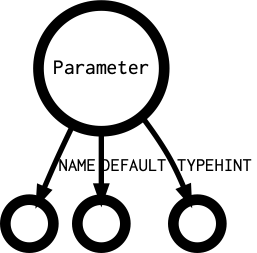
List of available properties :
- code
- ctype1_size
- fullcode
- lccode
- line
- nullable
- rank
- reference
- variadic
List of possible tokens :
- T_VARIABLE
List of outgoing links :
- DEFAULT
- DEFINITION
- NAME
- TYPEHINT
List of incoming links :
- ANALYZED
- ARGUMENT
- DEFINITION
- USE
13.5.2.74. Parametername¶
A Parametername
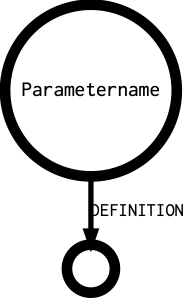
List of available properties :
- code
- ctype1
- ctype1_size
- fullcode
- lccode
- line
- rank
List of possible tokens :
- T_VARIABLE
List of outgoing links :
- DEFINITION
List of incoming links :
- ANALYZED
- GLOBAL
- NAME
13.5.2.75. Parent¶
The parent keyword, when it is used to refer to the parent class.

List of available properties :
- boolean
- code
- ctype1
- ctype1_size
- fullcode
- fullnspath
- intval
- lccode
- line
- noscream
List of possible tokens :
- T_STRING
- 1
List of outgoing links :
List of incoming links :
- ANALYZED
- CLASS
- DEFINITION
- NEW
- RETURNTYPE
- TYPEHINT
13.5.2.76. Parenthesis¶
A Parenthesis expression. This is not a syntactic parenthesis, like in a switch or functioncall.
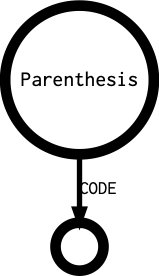
List of available properties :
- boolean
- code
- constant
- ctype1
- ctype1_size
- fullcode
- intval
- isNull
- lccode
- line
- noDelimiter
- noscream
- rank
List of possible tokens :
- T_OPEN_PARENTHESIS
List of outgoing links :
- CODE
List of incoming links :
- ANALYZED
- ARGUMENT
- CASE
- CAST
- CLONE
- CODE
- CONCAT
- CONDITION
- ELSE
- EXPRESSION
- INDEX
- LEFT
- NAME
- NOT
- OBJECT
- RETURN
- RIGHT
- SIGN
- SOURCE
- THEN
- THROW
- VALUE
- VARIABLE
13.5.2.77. Php¶
A PHP script, inside its tags. This exclude the following and previous raw text in a PHP file.
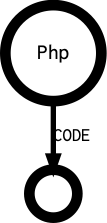
List of available properties :
- close_tag
- code
- ctype1_size
- fullcode
- lccode
- line
- rank
List of possible tokens :
- T_OPEN_TAG
List of outgoing links :
- CODE
List of incoming links :
- EXPRESSION
13.5.2.78. Phpvariable¶
A PHP reserved variable, such as $_GET, $_POST, $GLOBALS, etc.
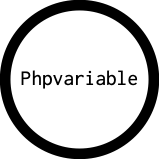
List of available properties :
- code
- ctype1
- ctype1_size
- fullcode
- lccode
- line
- noDelimiter
- rank
- reference
- variadic
List of possible tokens :
- T_VARIABLE
List of outgoing links :
List of incoming links :
- ANALYZED
- APPEND
- ARGUMENT
- CONCAT
- CONDITION
- DEFINITION
- ELSE
- LEFT
- RIGHT
- SOURCE
- THEN
- VALUE
- VARIABLE
13.5.2.79. Postplusplus¶
$i++` expression
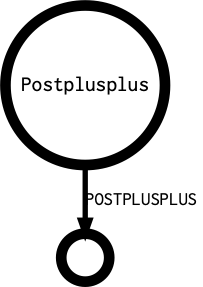
List of available properties :
- code
- ctype1
- ctype1_size
- fullcode
- lccode
- line
- rank
List of possible tokens :
- T_DEC
- T_INC
List of outgoing links :
- POSTPLUSPLUS
List of incoming links :
- ANALYZED
- ARGUMENT
- CODE
- CONCAT
- CONDITION
- ELSE
- EXPRESSION
- INDEX
- LEFT
- NOT
- RETURN
- RIGHT
- THEN
13.5.2.80. Power¶
The power operator, **.

List of available properties :
- boolean
- code
- ctype1
- ctype1_size
- fullcode
- intval
- lccode
- line
- noDelimiter
- rank
List of possible tokens :
- T_POW
List of outgoing links :
- LEFT
- RIGHT
List of incoming links :
- ARGUMENT
- CODE
- VALUE
13.5.2.81. Ppp¶
A properties declaration, in a class or a trait. For example : private $x, $y = 2;
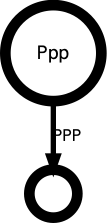
List of available properties :
- code
- count
- ctype1
- ctype1_size
- fullcode
- lccode
- line
- rank
- static
- visibility
List of possible tokens :
- T_PRIVATE
- T_PROTECTED
- T_PUBLIC
- T_STATIC
- T_VAR
- 1
List of outgoing links :
- PPP
List of incoming links :
- ANALYZED
- PPP
13.5.2.82. Preplusplus¶
++ or – when it is before the variable.
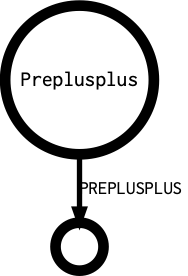
List of available properties :
- code
- ctype1
- ctype1_size
- fullcode
- lccode
- line
- rank
List of possible tokens :
- T_DEC
- T_INC
List of outgoing links :
- PREPLUSPLUS
List of incoming links :
- ANALYZED
- ARGUMENT
- CODE
- CONCAT
- CONDITION
- ELSE
- EXPRESSION
- INDEX
- LEFT
- NOT
- RETURN
- RIGHT
- VALUE
- YIELD
13.5.2.83. Print¶
A call to the function print.

List of available properties :
- code
- count
- ctype1
- ctype1_size
- fullcode
- fullnspath
- lccode
- line
- rank
List of possible tokens :
- T_PRINT
List of outgoing links :
- ARGUMENT
List of incoming links :
- ANALYZED
- ELSE
- EXPRESSION
- RIGHT
- THEN
13.5.2.84. Project¶
The project node : the root above all File.

List of available properties :
- code
- ctype1_size
- fullcode
- lccode
- line
List of possible tokens :
- T_WHOLE
List of outgoing links :
- PROJECT
List of incoming links :
13.5.2.85. Propertydefinition¶
A property definition. For example : class x { private $property = 1; var $x; }
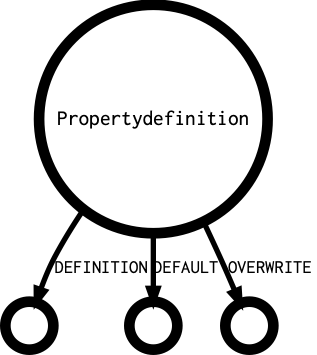
List of available properties :
- code
- ctype1
- ctype1_size
- fullcode
- lccode
- line
- propertyname
- rank
List of possible tokens :
- T_VARIABLE
- 1
List of outgoing links :
- DEFAULT
- DEFINITION
- OVERWRITE
List of incoming links :
- ANALYZED
- OVERWRITE
- PPP
13.5.2.86. Real¶
A float number

List of available properties :
- boolean
- code
- constant
- ctype1
- ctype1_size
- fullcode
- intval
- lccode
- line
- noDelimiter
- rank
- variadic
List of possible tokens :
- T_DNUMBER
List of outgoing links :
List of incoming links :
- ARGUMENT
- CAST
- CODE
- CONCAT
- DEFAULT
- ELSE
- INDEX
- LEFT
- RETURN
- RIGHT
- THEN
- VALUE
13.5.2.87. Return¶
The return expression.

List of available properties :
- code
- constant
- ctype1
- ctype1_size
- fullcode
- lccode
- line
- rank
List of possible tokens :
- T_RETURN
List of outgoing links :
- RETURN
List of incoming links :
- ANALYZED
- EXPRESSION
13.5.2.88. Self¶
The self keyword, as used inside a class.

List of available properties :
- boolean
- code
- ctype1
- ctype1_size
- fullcode
- fullnspath
- intval
- lccode
- line
- noscream
- reference
List of possible tokens :
- T_STRING
- 1
List of outgoing links :
List of incoming links :
- ANALYZED
- CLASS
- DEFINITION
- NAME
- NEW
- RETURNTYPE
- TYPEHINT
13.5.2.89. Sequence¶
A virtual atom, that represents the sequence of expression, in a block.
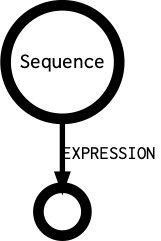
List of available properties :
- boolean
- bracket
- code
- constant
- count
- ctype1
- ctype1_size
- fullcode
- lccode
- line
- rank
- root
List of possible tokens :
- T_CLOSE_CURLY
- T_CLOSE_PARENTHESIS
- T_COLON
- T_CONSTANT_ENCAPSED_STRING
- T_INLINE_HTML
- T_OPEN_CURLY
- T_OPEN_TAG
- T_SEMICOLON
- T_SWITCH
List of outgoing links :
- EXPRESSION
List of incoming links :
- ANALYZED
- BLOCK
- CASES
- CODE
- ELSE
- EXPRESSION
- FILE
- FINAL
- INCREMENT
- INIT
- THEN
13.5.2.90. Shell¶
A shell, made with ticks `

List of available properties :
- code
- count
- ctype1
- ctype1_size
- fullcode
- lccode
- line
- noDelimiter
- rank
List of possible tokens :
- T_SHELL_QUOTE
List of outgoing links :
- CONCAT
List of incoming links :
- ARGUMENT
- EXPRESSION
- RIGHT
13.5.2.91. Sign¶
A Sign structure : when a -`or `+ has been added before another expression. For example - ($a + $b).
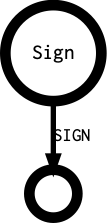
List of available properties :
- code
- ctype1
- ctype1_size
- fullcode
- lccode
- line
- rank
List of possible tokens :
- T_CLOSE_BRACKET
- T_CLOSE_PARENTHESIS
- T_CONSTANT_ENCAPSED_STRING
- T_LNUMBER
- T_STRING
- T_VARIABLE
- 1
List of outgoing links :
- SIGN
List of incoming links :
- ARGUMENT
- CAST
- CODE
- ELSE
- LEFT
- RETURN
- RIGHT
- THEN
- VALUE
13.5.2.92. Static¶
The static keyword, when it is used to refer to the current class.
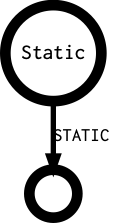
List of available properties :
- code
- count
- ctype1
- ctype1_size
- fullcode
- fullnspath
- lccode
- line
- rank
List of possible tokens :
- T_STATIC
List of outgoing links :
- STATIC
List of incoming links :
- CLASS
- DEFINITION
- EXPRESSION
- NAME
13.5.2.93. Staticclass¶
A call to ::class, with the syntax of a static constant. For example, X::class.
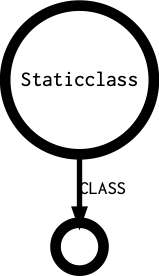
List of available properties :
- boolean
- code
- constant
- ctype1
- ctype1_size
- fullcode
- intval
- lccode
- line
- noDelimiter
- rank
List of possible tokens :
- T_DOUBLE_COLON
List of outgoing links :
- CLASS
List of incoming links :
- ANALYZED
- ARGUMENT
- CASE
- CODE
- CONCAT
- DEFAULT
- ELSE
- INDEX
- LEFT
- RETURN
- RIGHT
- THEN
- VALUE
- YIELD
13.5.2.94. Staticconstant¶
A staticconstant : TheClass::TheConstant
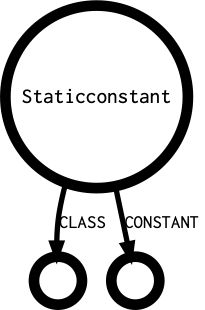
List of available properties :
- boolean
- code
- constant
- ctype1
- ctype1_size
- fullcode
- intval
- lccode
- line
- noDelimiter
- rank
List of possible tokens :
- T_DOUBLE_COLON
- 1
List of outgoing links :
- CLASS
- CONSTANT
List of incoming links :
- ANALYZED
- ARGUMENT
- CASE
- CODE
- CONCAT
- CONDITION
- DEFAULT
- DEFINITION
- ELSE
- EXPRESSION
- INDEX
- LEFT
- NOT
- RETURN
- RIGHT
- THEN
- VALUE
- VARIABLE
13.5.2.95. Staticdefinition¶
A static variable definition, in a method or function. This is not a static property. For example ; function foo() { static $s; }.
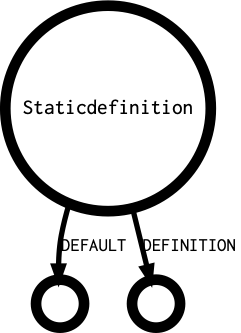
List of available properties :
- code
- ctype1
- ctype1_size
- fullcode
- lccode
- line
- rank
List of possible tokens :
- T_VARIABLE
List of outgoing links :
- DEFAULT
- DEFINITION
List of incoming links :
- ANALYZED
- DEFINITION
- GLOBAL
- STATIC
13.5.2.96. Staticmethod¶
A staticmethod name, when using trait and renaming a method. For example, trait t { use t2 { C::D as E; }}. C::D is a static method.
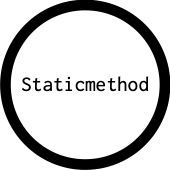
List of available properties :
- code
- ctype1
- ctype1_size
- fullcode
- fullnspath
- lccode
- line
List of possible tokens :
- T_DOUBLE_COLON
- T_STRING
List of outgoing links :
- CLASS
- METHOD
List of incoming links :
- ANALYZED
- DEFINITION
- NAME
- NEW
- SOURCE
13.5.2.97. Staticmethodcall¶
A static methodcall
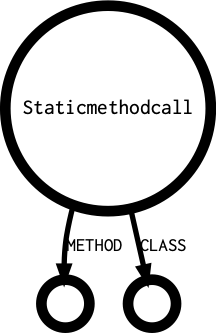
List of available properties :
- code
- ctype1
- ctype1_size
- fullcode
- lccode
- line
- rank
List of possible tokens :
- T_DOUBLE_COLON
List of outgoing links :
- CLASS
- METHOD
List of incoming links :
- ANALYZED
- APPEND
- ARGUMENT
- CAST
- CODE
- CONCAT
- CONDITION
- DEFINITION
- ELSE
- EXPRESSION
- INDEX
- LEFT
- NAME
- NEW
- NOT
- OBJECT
- RETURN
- RIGHT
- SIGN
- SOURCE
- THEN
- THROW
- VALUE
- VARIABLE
13.5.2.98. Staticproperty¶
A static property syntax. For example, A::$b or self::$d.
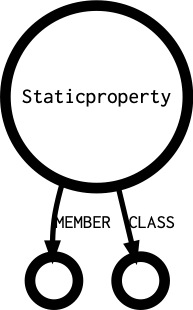
List of available properties :
- code
- ctype1
- ctype1_size
- fullcode
- lccode
- line
- rank
List of possible tokens :
- T_DOUBLE_COLON
- 1
List of outgoing links :
- CLASS
- MEMBER
List of incoming links :
- ANALYZED
- APPEND
- ARGUMENT
- CASE
- CODE
- CONCAT
- CONDITION
- DEFINITION
- ELSE
- EXPRESSION
- INDEX
- LEFT
- NOT
- OBJECT
- POSTPLUSPLUS
- PREPLUSPLUS
- RETURN
- RIGHT
- SOURCE
- THEN
- VALUE
- VARIABLE
13.5.2.99. Staticpropertyname¶
The name of a static property : not a variable.
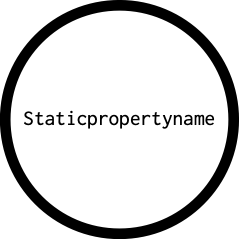
List of available properties :
- code
- ctype1_size
- fullcode
- lccode
- line
List of possible tokens :
- T_VARIABLE
- 1
List of outgoing links :
List of incoming links :
- ANALYZED
- DEFINITION
- MEMBER
- NAME
13.5.2.100. String¶
A string literal, with or without interpolation. For example, ‘$x’, “a{$y}”, “a”.
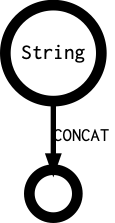
List of available properties :
- binaryString
- block
- boolean
- cbMethod
- code
- constant
- count
- ctype1
- ctype1_size
- delimiter
- encoding
- fullcode
- fullnspath
- intval
- lccode
- line
- noDelimiter
- noscream
- rank
- variadic
List of possible tokens :
- T_CONSTANT_ENCAPSED_STRING
- T_ENCAPSED_AND_WHITESPACE
- T_QUOTE
- T_STRING
List of outgoing links :
- CONCAT
List of incoming links :
- ANALYZED
- ARGUMENT
- CASE
- CAST
- CODE
- CONCAT
- DEFAULT
- DEFINITION
- ELSE
- EXPRESSION
- INDEX
- LEFT
- NAME
- OBJECT
- RETURN
- RIGHT
- THEN
- VALUE
- VARIABLE
- YIELD
13.5.2.101. Switch¶
A switch structure.
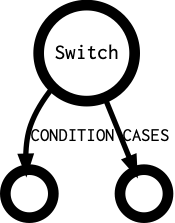
List of available properties :
- code
- ctype1
- ctype1_size
- fullcode
- lccode
- line
- rank
List of possible tokens :
- T_SWITCH
- 1
List of outgoing links :
- CASES
- CONDITION
List of incoming links :
- ANALYZED
- EXPRESSION
13.5.2.102. Ternary¶
The ternary operator : $a ? $b : ‘c’.
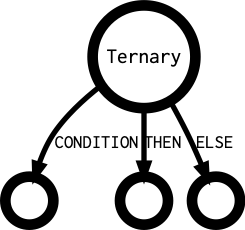
List of available properties :
- boolean
- code
- constant
- ctype1
- ctype1_size
- fullcode
- intval
- isNull
- lccode
- line
- noDelimiter
- rank
List of possible tokens :
- T_QUESTION
List of outgoing links :
- CONDITION
- ELSE
- THEN
List of incoming links :
- ANALYZED
- ARGUMENT
- CODE
- CONDITION
- DEFAULT
- ELSE
- EXPRESSION
- INDEX
- NAME
- RETURN
- RIGHT
- SOURCE
- THEN
- THROW
- VALUE
13.5.2.103. This¶
The special variable $this.

List of available properties :
- code
- ctype1
- ctype1_size
- fullcode
- fullnspath
- lccode
- line
- noscream
- rank
- reference
List of possible tokens :
- T_VARIABLE
- 1
List of outgoing links :
List of incoming links :
- ANALYZED
- ARGUMENT
- CAST
- CLASS
- CLONE
- DEFINITION
- ELSE
- EXPRESSION
- LEFT
- NEW
- OBJECT
- RETURN
- RIGHT
- SOURCE
- THEN
- VALUE
- VARIABLE
- YIELD
13.5.2.104. Throw¶
A throw expression

List of available properties :
- code
- ctype1
- ctype1_size
- fullcode
- lccode
- line
- rank
List of possible tokens :
- T_THROW
- 1
List of outgoing links :
- THROW
List of incoming links :
- ANALYZED
- EXPRESSION
13.5.2.105. Trait¶
A trait. For example : trait t { function foo() {} }
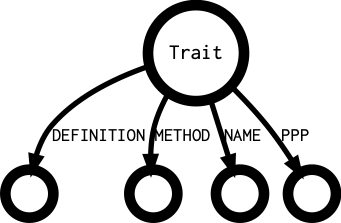
List of available properties :
- code
- ctype1_size
- fullcode
- fullnspath
- lccode
- line
- rank
List of possible tokens :
- T_TRAIT
List of outgoing links :
- DEFINITION
- MAGICMETHOD
- METHOD
- NAME
- PPP
- USE
List of incoming links :
- ANALYZED
- EXPRESSION
13.5.2.106. Try¶
The Try part in a try/catch/finally expression.
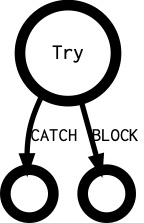
List of available properties :
- code
- count
- ctype1
- ctype1_size
- fullcode
- lccode
- line
- rank
List of possible tokens :
- T_TRY
- 1
List of outgoing links :
- BLOCK
- CATCH
- FINALLY
List of incoming links :
- ANALYZED
- EXPRESSION
13.5.2.107. Unset¶
A call to unset
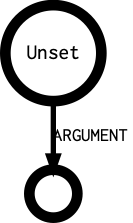
List of available properties :
- args_max
- args_min
- code
- count
- ctype1
- ctype1_size
- fullcode
- fullnspath
- lccode
- line
- rank
List of possible tokens :
- T_UNSET
- 1
List of outgoing links :
- ARGUMENT
List of incoming links :
- ANALYZED
- EXPRESSION
13.5.2.108. Usenamespace¶
Use expression within a namespace, and not in a class or trait.
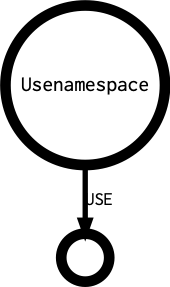
List of available properties :
- code
- ctype1_size
- fullcode
- lccode
- line
- rank
List of possible tokens :
- T_USE
- 1
List of outgoing links :
- CONST
- FUNCTION
- USE
List of incoming links :
- ANALYZED
- EXPRESSION
13.5.2.109. Usetrait¶
A use expression, when used to import a trait. For exapmle, class x { use t; }
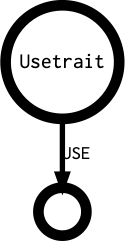
List of available properties :
- code
- ctype1_size
- fullcode
- lccode
- line
- rank
List of possible tokens :
- T_USE
List of outgoing links :
- BLOCK
- USE
List of incoming links :
- ANALYZED
- USE
13.5.2.110. Variable¶
A Variable, as a standalone container. For example : $a = 1 or $b += 3. Variables in arrays are Variablearray, while variables in objects are Variableobject.
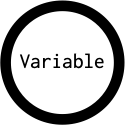
List of available properties :
- code
- ctype1
- ctype1_size
- enclosing
- fullcode
- fullnspath
- lccode
- line
- noDelimiter
- noscream
- rank
- reference
- variadic
List of possible tokens :
- T_CURLY_OPEN
- T_DOLLAR
- T_DOLLAR_OPEN_CURLY_BRACES
- T_STRING_VARNAME
- T_VARIABLE
List of outgoing links :
- NAME
List of incoming links :
- ANALYZED
- APPEND
- ARGUMENT
- CASE
- CAST
- CLASS
- CLONE
- CODE
- CONCAT
- CONDITION
- DEFINITION
- ELSE
- EXPRESSION
- GLOBAL
- INDEX
- LEFT
- MEMBER
- NAME
- NEW
- NOT
- OBJECT
- POSTPLUSPLUS
- PREPLUSPLUS
- RETURN
- RETURNED
- RIGHT
- SIGN
- SOURCE
- THEN
- THROW
- VALUE
- VARIABLE
- YIELD
13.5.2.111. Variablearray¶
A variable, when used to build an array syntax. For example, the $x in $x[0] or $x[].
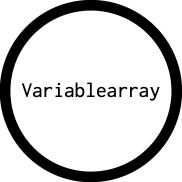
List of available properties :
- code
- ctype1
- ctype1_size
- fullcode
- lccode
- line
List of possible tokens :
- T_STRING_VARNAME
- T_VARIABLE
List of outgoing links :
List of incoming links :
- ANALYZED
- APPEND
- DEFINITION
- RETURNED
- VARIABLE
13.5.2.112. Variabledefinition¶
A placeholder to federate local variable definition in a method.
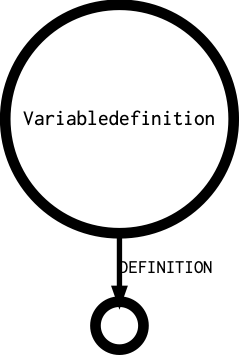
List of available properties :
- code
- ctype1
- ctype1_size
- fullcode
- lccode
- line
- rank
List of possible tokens :
List of outgoing links :
- DEFAULT
- DEFINITION
List of incoming links :
- DEFINITION
- GLOBAL
- STATIC
13.5.2.113. Variableobject¶
A variable when used with the -> operator.
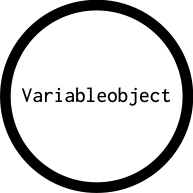
List of available properties :
- code
- ctype1
- ctype1_size
- fullcode
- lccode
- line
- noscream
- reference
List of possible tokens :
- T_VARIABLE
List of outgoing links :
List of incoming links :
- ANALYZED
- DEFINITION
- NAME
- OBJECT
- RETURNED
13.5.2.114. Void¶
A Void operation. It represents the absence of data. For example : foo();; : there is a Void as argument, and one between the semicolons.

List of available properties :
- boolean
- code
- constant
- ctype1
- ctype1_size
- fullcode
- intval
- isNull
- lccode
- line
- noDelimiter
- rank
List of possible tokens :
- v
List of outgoing links :
List of incoming links :
- ANALYZED
- ARGUMENT
- BLOCK
- BREAK
- CAST
- CODE
- CONTINUE
- EXPRESSION
- NAME
- RETURN
- THEN
- YIELD
13.5.2.115. While¶
A While structure, different from a Dowhile structure. For example : while($a < 10) { $a++;}
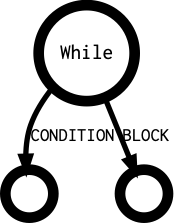
List of available properties :
- alternative
- code
- ctype1
- ctype1_size
- fullcode
- lccode
- line
- rank
List of possible tokens :
- T_WHILE
List of outgoing links :
- BLOCK
- CONDITION
List of incoming links :
- ANALYZED
- EXPRESSION
13.5.2.116. Yield¶
A yield expression
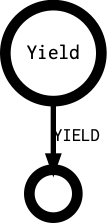
List of available properties :
- code
- constant
- ctype1
- ctype1_size
- fullcode
- lccode
- line
- rank
List of possible tokens :
- T_YIELD
List of outgoing links :
- YIELD
List of incoming links :
- ANALYZED
- ARGUMENT
- CONCAT
- CONDITION
- EXPRESSION
- LEFT
- RIGHT
- YIELD
13.5.2.117. Yieldfrom¶
A yield from expression
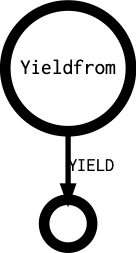
List of available properties :
- code
- ctype1
- ctype1_size
- fullcode
- lccode
- line
- rank
List of possible tokens :
- T_YIELD_FROM
List of outgoing links :
- YIELD
List of incoming links :
- ANALYZED
- ARGUMENT
- EXPRESSION
- LEFT
13.5.3. Atom properties¶
Each atom in the database has a list of properties. They hold information about the current atom, that are not available through the network.
To check those properties, there are some specific method calls.
- label : this is the type of atom.
- code : the value of the PHP token. For a variable, it is $name, while for a function, it is the function name foo instead of foo(1,2,3)
- token : the name of the current PHP token. They use the same names as inside PHP, plus a couple of special values. They are strings, and not integers
- fullcode : this is a normalized representation of the code. It include the current atom, and its important dependencies
- rank : the position of the current atom in a list of similar element, like arguments in a functioncall. rank starts at 0.
- reference : is this atom is a reference, marked with ‘&’
- variadic : is this atom is a variadic, marked with ‘…’
- noscream : is this atom is a variadic, marked with ‘@’
- block : is this atom enclosed in curly braces (only available for Sequence)
- heredoc : is this a Heredoc (true), or a Nowdoc (false) (only available for Heredoc)
- delimiter : delimiter used for string : ‘, ” or nothing
- noDelimiter : the actual value of the string, without the delimiters
- count : count of elements. For example, count in a functioncall represents the number of arguments.
- fullnspath : the Full Qualified Name, as it was resolved at compile time.
- absolute : is this name absolute or not (only available for Nsname)
- alias : the alias name (only available for Usenamespace)
- origin : the origin for the use expression (only available for Usenamespace)
- encoding : Unicode block for the current string
- intval : the value of the atom, when cast as integer
- strval : the value of the atom, when cast as string
- boolean : the value of the atom, when cast as boolean
- args_max : maximum number of arguments (only available for Function, Method, Closure, Magicmethod)
- args_min : minimum number of arguments (only available for Function, Method, Closure, Magicmethod)
- enclosing : is the atom inside curly braces (only available for Variable inside a string)
- bracket : is the current array a short syntax or a traditional syntax (only available for Arrayliteral)
- flexible : is the Heredoc using the flexible syntax
- close_tag : has the Php atom the closing tag or not
- aliased : is the current tag aliased with a use expression, or not
- constant : is the current atom a constant value. atom are constant if they are build with constant values, like other constants or literals.
- root : is this the root node
- globalvar : the simple name of the variable, in the global syntax. For example, $GLOBALS[‘x’] is actually $x in the global space
- binaryString : the equivalent of strval, but after replacing the PHP escape sequence with their actual value. For example, “064” is turned into “4”. This is valid for PHP sequences, unicode codepoint, etc.
- visibility : the visibility for the property, constant or method. (only available for Const, Method, Magicmethod, Propertydefinition)
- final : is the current class or method final (only available for Class, Method and Magicmethod)
- abstract : is the current class or method abstract (only available for Class, Method and Magicmethod)
- static : is the current class, property or method static (only available for Class, Method, Property and Magicmethod)
13.5.4. Links¶
Links are the relation established between the atoms. You can move from one to the other by using links.
Links are defined only with their label. A link between a ‘Not’ atom, and its operand is called ‘NOT’.
There may be several links from an atom : for example, Addition has two outgoing links : ‘LEFT’ and ‘RIGHT’.
Some links are always available, like ‘CONDITION’ and ‘THEN’ for Ifthen. ‘ELSE’ is not always available, depending on the code.
Some links may be repeated as often as necessary. For example, ‘CONCAT’ is the building block for ‘Concatenation’ : there may be from 2 ‘CONCAT’ link to a lot more.
Links are oriented : they always start from the mentioned atom, and go to the next. Leaving the current atom is the ‘OUT’ direction, while going back to the originating atom is ‘IN’.
The destination atom type is rarely defined. PHP always provides a lot of freedom, and various expressions may be used at the same place. Consider calling a function : foo(), foo(), ‘$foo()`, foo()(), $foo[1](). So, the target for ‘NAME’ from a ‘Functioncall’ atom, may be a ‘Name’, ‘Nsname’, ‘Variable’, ‘Functioncall’, ‘Array’. Usually, it is important to always check the landing atom, before accessing properties.
13.5.6. Dictionaries¶
There are a collection of dictionaries available. Dictionaries hold list of definition, like PHP’s constant and functions, extension’s classes, or classes from unit test frameworks.
13.6. Documentation¶
Documentation is used to build automatic documentation for audit report : every time an analysis is run, its documentation is provided in the audits.
Every Exakat analysis <Folder/Name> has a documentation, stored in the ‘human/en’ folder, as a .ini file.
Keep the .ini files compiled, as PHP will refuse to load them otherwise. Then, Exakat will stop the processing : no documentation, no analysis.
The documentation is in international English.Localisation will be handled in the future, as other folders inside ‘human’.
Each analysis has a standard structure, with the following elements :
- name : the title used for the analysis. Keep it as short as possible, as it is used for short references in reports.
- description: A complete description of the analysis. The description should include a short introduction, a detailled explanation of the targe situations, a piece of code with good recommended code as a first illustration, and various bad situations as second example. The description should also include limitations from the analysis, if any. It should also include external links, including PHP.net documentation and tutorials, to help the reader learn more about the problem.
- exakatSince: This is the version where the analysis was created. For example : “1.4.0”
- modifications: This is an array of strings : each string is a short suggestions on what kind of refactoring may be done once the analysis has spotted the issue. Suggestions should be as precise as possible. Provide as many suggestions as possible, as the problem may often be solved from different angles.
13.7. Testing your analysis¶
Every analysis has its own set of unit test. They check that the analysis finds every pattern it intend to find, and it doesn’t find the other patterns. As such, it is important to test for expected and unwanted results.
Expected results are patterns that you expect to find. But sometimes, analysis are too broad, and collect a number extra situations that are false positives. To avoid collecting them, and to document that they should not be found, unit tests have to be written.
Analysis tests are located in the tests/analyzer/ folder. In that folder, there is :
- Test folder : it contains the PHPUnit classes, and is automatically generated. Don’t open it.
- source : this folder contains the PHP code source for the tests.
- exp : this folder contains the expected results of an analysis on the corresponding source code.
- random.php : this is a PHPUnit test suite that runs a random selection of unit tests
- alltests.php : this is a PHPUnit test suite that runs all the unit tests. It also checks some of the test Structures
- create_test.php : use this tool to create and add a new test to Exakat unit test list. It will create all the necessary files
Unit are run with PHPUnit version 7.0+. They were tested with PHPUnit 7.3.5 and are supposed to work with other minor versions.
13.8. Writing test¶
Tests must be written to match patterns and to not-match anti-patterns.
For example, imagine that we are analyzing code to find useless additions. We want to match $a + 0, $a - 0, 0 + $a but not 0 - $a. The last one doesn’t have the same effect than the others : here the - sign has an important value. As such, $a + 0, $a - 0, 0 + $a must go in the $expected array, and 0 - $a must go in the $expected_not array.
The unit test framework also supports code source as folders. There are situations where PHP refuses to compile a piece of code if all the code is in a single script, but accepts the same code when split over two or several files. For that, use the create_test.php with -d option, so as to create the folder with the test. source/Custom/MyFirst.0x.php will be created as a folder (including with the ‘.php’ extension). Otherwise, simply remove the source/Custom/MyFirst.0x.php file, and create a folder of the same name instead.
PHP source for tests only have to compile without warning. There is no need for the PHP test script to run, nor to make any sense : this code will be audited, but not run.
13.8.1. Pieces of advice¶
- In the PHP source for the test, always try to give names that help understand where is the error being hunter, and what are clean situations. This may be done by giving explicit names to functions and variables.
- Try to keep the PHP source in a single file. When it is not possible, rely on a directory, with little files.
- When building a test, remove any name that link it to an existing code. Often, simply changing the name ‘$EXPLICIT_GLOBAL’ to ‘$X’ is enough.
13.9. Tooling¶
There are three scripts to simplify manipulations when managing an analyzer.
They are located in the scripts folder. They must be called from Exakat’s code root, and not from within the script folder.
- createAnalyzer <Folder/Name>: this tool creates a new analyzer in the ‘Folder’ folder, with the name ‘Name’. At the time of creation, it creates also the documentation in ‘human/en/Folder/Name.ini’ file, and a first set of tests in the ‘tests/analyzer/’. Finally, it sets up the analyzer in the data/analyzers.sqlite folder.
- renameAnalyzer <Folder1/Name1> <Folder2/Name2>: this tool moves the analyzer called <Folder1/Name1> to <Folder2/Name2>. It moves the code in ‘library/Exakat/Analyzer/’, in the tests, and in the ‘human/en’ folder.
- removeAnalyzer <Folder/Name>: this tool removes the analyzer called <Folder/Name>. It removes the code in ‘library/Exakat/Analyzer/’, in the tests, and in the ‘human/en’ folder.
The scripts are only available with the open source version. Exakat.phar doesn’t have support for those scripts.
13.10. Publishing your analysis¶
To be written.